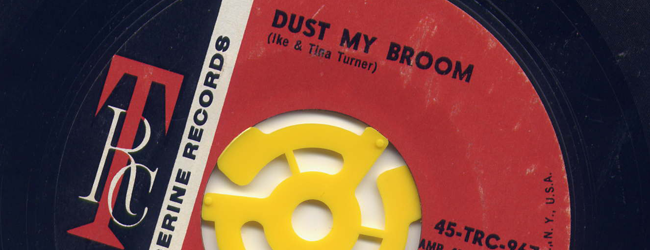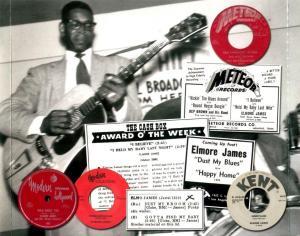Today, we’re bringing you another entry in American Blues Scene’s exclusive “Brief History of a Song” series.
“I believe I’ll dust my broom”, as both a phrase and a song, has been a blues staple for 75 years. Versions of the song’s melody and iconic phrase “I believe I’ll” have been around even longer. The phrase “dust my broom”, while it has been subject to minor debate, means to leave and not come back. Perhaps unsurprisingly as blues staples go, the widely popular “I Believe I’ll Dust My Broom” was an original Robert Johnson tune, first recorded during his “San Antonio” session in the winter of 1936.
Upon it’s first release, Johnson’s version only sold marginally well. While the melody was traditionally common, Johnson played in a style that was entirely unique, accompanying himself with finger picking that often sounded like a second guitarist to casual listeners. It’s been theorized — and is entirely likely — that Johnson derived his iconic song from several earlier popular records, including “Believe I’ll Go Back Home” by Jack Kelly, and “Mr. Carl’s Blues” from Carl Rafferty, which contain similar verses such as “I believe I’ll dust my broom” and “I’m going to call up China, see if my baby’s over there.” Borrowing lyrics in blues was (and continues to be) common. Johnson’s version, however, has stunning and original guitar work that would prove to be influential for decades to come. In song, Johnson mentions Helena, Arkansas, which is just across the Mississippi River and roughly 20 miles from Clarksdale, Mississippi. Helena is now the home of the long-standing King Biscuit Blues Festival.
In 1951, fifteen years after the original, Elmore James recorded a version of “Dust My Broom” for the relatively short lived, but massively important Trumpet Records. James’ version incorporated Sonny Boy Williamson (II)’s memorable harmonica and Elmore’s vastly influential slide guitar. The song made Trumpet Records, which resided on Farrish Street in Jackson, Mississippi — a street that once rivaled Beale in terms of music and entertainment. James’ version of “Broom” was the label’s biggest hit, reaching #9 on Billboard’s R&B chart. It’s success attracted a great many talented acts. Four years later, the label was lost to creditors. While there is a blues trail marker at Farrish commemorating Trumpet (and James’ “Dust My Broom”), and plans have been made several times to renovate the once-great street into a “Beale”-style attraction, it remains a dangerous and run down ghost of it’s former glory. James’ song, however, grew to take a life of it’s own. His hard driving slide guitar work would lay the foundation for a great many songs and covers after it.
28 years after Elmore recorded what would quickly become one of the most popular versions of “Broom”, another band with menacing guitar, long beards, and the ability to fuse hard-driven Texas rock with the blues they revered, released the critically and commercially acclaimed Degüello. ZZ Top’s version of “Broom”, with Elmore James style slide, was a hit, and helped solidify the boys from Texas as mainstays in music.
Since Johnson waxed his iconic record in an old hotel room, “Dust My Broom” has mushroomed into a musical staple, being covered by Howlin’ Wolf, Freddy King, R.L. Burnside, Joe Lewis Walker, Johnny Winter, Mick Jagger, Taj Mahal, James Cotton and dozens more. Even bad actor/cop Steven Seagal recorded a version with Louisiana Red! The lyrics, as is the case with many great blues songs, have been adopted into dozens of other songs across many genres. Often times, discussions about the most influential bluesman or woman sound like a broken record as Robert Johnson, the mysterious figure we know virtually nothing about, is lauded for his few but powerful recordings. Songs like “Dust My Broom” are the reason why.
I Believe I’ll Dust My Broom
Robert Johnson, 1936I’m goin’ get up in the mornin’, I believe I’ll dust my broom
I’m goin’ get up in the mornin’, I believe I’ll dust my broom
Girlfriend, the black man you been lovin’, girlfriend, can get my roomI’m gon’ write a letter, telephone every town I know
I’m gon’ write a letter, telephone every town I know
If I can’t find her in West Helena, she must be in East Monroe I knowI don’t want no woman, wants every downtown man she meet
I don’t want no woman, wants every downtown man she meet
She’s a no good (doney?), they shouldn’t allow her on the streetI believe, I believe I’ll go back home
I believe, I believe I’ll go back home
You can mistreat me here, babe, but you can’t when I go homeAnd I’m gettin’ up in the mornin’, I believe I’ll dust my broom
I’m gettin’ up in the mornin’, I believe I’ll dust my broom
Girlfriend, the black man you been lovin’, girlfriend, can get my roomI’m gonna call up Chiney, see is my good girl over there
I’m gonna call up China, see is my good girl over there
If I can’t find her on Philippine’s island, she must be in Ethiopia somewhere
Read more in the American Blues Scene’s exclusive “Brief History of a Song” series
Shop for great band and blues music t-shirts at Bluescentric.com




2 Comments
GREAT… And I do mean a great piece Matt! About time someone wrote an overview of one of the MOST iconic (and revered) pieces of music ever written. Kudos brother!
Good piece . For another Story of this son have a look here. For an overview of about 1400 versions of this song have a look at my website Overview of versions of Dust My Broom